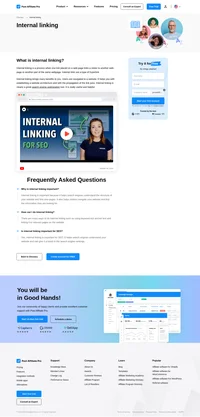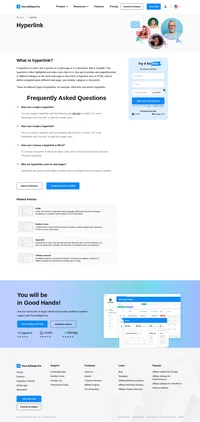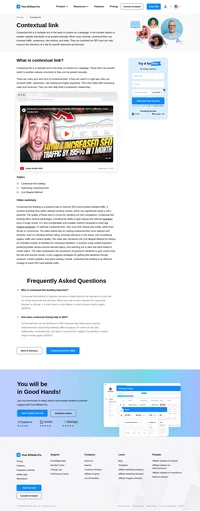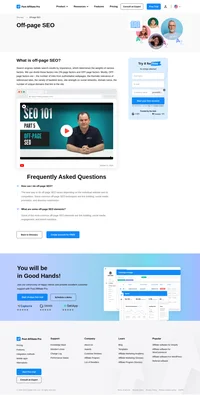What is Link Juice?
Link Juice, a colloquial term within the SEO (Search Engine Optimization) realm, refers to the value or authority that a webpage transfers to another through hyperlinks. This concept is pivotal in understanding how websites gain prominence and visibility on search engines. The term “juice” signifies the power or equity passed through links, acting as endorsements from one site to another. This transfer of value can significantly impact the receiving site’s search engine rankings, making it a crucial component of SEO strategies.
In the realm of SEO, link juice is often seen as a reflection of a site’s credibility and trustworthiness. It is used to evaluate the strength and potential influence of a webpage’s backlink profile. The more link juice a page has, the more likely it is to rank higher on search engine result pages (SERPs). This is because search engines view these links as votes of confidence, suggesting that the content is valuable and worth ranking prominently.

How Does Link Juice Work?
Link Juice operates on the principle that hyperlinks are endorsements or votes of confidence from one site to another. When a webpage links to another, it passes a portion of its authority to the linked page. This is akin to a recommendation, signaling to search engines that the linked content is valuable and relevant. The more authoritative the linking site, the more substantial the link juice it can pass.
The flow of link juice is not uniform and depends on several factors including the relevance of the content, the authority of the linking page, and the context in which the link is placed. High-quality content naturally attracts more links, which leads to more link juice and better SEO performance.
Internal vs. External Links
Link juice can flow through both internal and external links:
- External Links: These are links from one domain to another. They are often considered more valuable because they represent an endorsement from an independent third party. External links help in building a site’s authority and credibility, especially if they come from high-authority sites.
- Internal Links: These are links that connect different pages within the same domain. While they may not carry the same weight as external links, they are essential for distributing link juice throughout a website, enhancing the visibility of internal pages. Internal linking helps improve navigation, user experience, and ensures that link juice is passed to important pages within a site.
Factors Affecting Link Juice
Several factors influence the amount of link juice a page can pass:
- Relevance: Links from pages with content relevant to the linked page are more valuable. Search engines assess the topical relevance of the linking and linked pages to determine the effectiveness of the link juice transfer.
- Authority: High-authority sites, often determined by their backlink profiles and trust metrics, pass more link juice. The credibility of a site is a significant determinant of how much juice it can pass.
- Link Type: Dofollow links pass link juice, whereas nofollow links do not. Nofollow links contain an HTML attribute that tells search engines not to pass link equity.
- Crawlability: Links must be crawlable by search engines to pass link juice. If a link is hidden behind scripts or inaccessible to search engine bots, it won’t pass any juice.
- Link Placement: Links embedded within the body of content carry more weight than those in footers or sidebars. Contextual links are more likely to be clicked by users, making them more valuable.
- Number of Outbound Links: A page with fewer outbound links distributes more juice to each linked page. If there are too many links, the juice gets divided, weakening its effect on each individual link.
Link Juice in Affiliate Marketing
In the context of affiliate marketing, link juice plays a vital role in enhancing the visibility and credibility of affiliate websites. By strategically acquiring backlinks from authoritative sources, affiliate marketers can boost their site’s search engine rankings, leading to increased traffic and potential conversions.
Affiliate Marketing and Link Building
Affiliate marketers can leverage link juice by engaging in ethical link-building practices, such as guest blogging, creating shareable content, and forming partnerships with other websites in their niche. These efforts can help accumulate valuable backlinks, enhancing the overall authority of the affiliate site. The ultimate goal is to build a reputable backlink profile that positively impacts search engine rankings and drives more organic traffic.
Sculpting Link Juice
Historically, SEO practitioners engaged in PageRank sculpting, a technique to manipulate the flow of link juice by using nofollow attributes on certain links. However, changes in Google’s algorithm have rendered this practice less effective. Today, the focus is on creating a natural and balanced link structure that allows link juice to flow organically throughout a site.
Maintaining a Natural Link Profile
To maintain a healthy link profile, it’s crucial to focus on acquiring high-quality, relevant backlinks while avoiding manipulative practices such as link schemes or excessive reciprocal linking. A natural link profile not only enhances link juice flow but also aligns with modern SEO guidelines set by search engines like Google. Adhering to these guidelines prevents penalties and ensures long-term SEO success.
Maximizing Link Juice
To maximize the benefits of link juice, consider the following strategies:
- Content Creation: Develop high-quality, authoritative content that naturally attracts backlinks. Original and engaging content is more likely to be shared and linked to by other sites.
- Guest Blogging: Write articles for reputable websites in exchange for a backlink. This not only provides link juice but also exposes your content to a broader audience.
- Internal Linking: Ensure a logical internal link structure to distribute link juice effectively across your site. This improves site navigation and user experience while ensuring essential pages receive adequate link juice.
- Anchor Text Strategy: Use varied and relevant anchor texts to avoid over-optimization. Diverse anchor texts appear more natural and prevent search engine penalties.
- Link Reclamation: Identify and reclaim broken or lost links to recover link juice. Regularly audit your site’s link profile to find and fix broken links, ensuring continuous flow of link juice.
Link Juice and Domain Authority
Link juice contributes to a site’s domain authority, a metric that predicts how well a website will rank on search engine results pages (SERPs). By building a robust backlink profile, websites can enhance their domain authority, leading to improved visibility and search rankings. Domain authority is a long-term SEO asset that requires consistent link-building efforts and high-quality content.

Understanding and leveraging link juice can significantly boost your website's visibility and, subsequently, your affiliate marketing success.
What is Link Juice?
Link juice is a metaphorical term used in SEO to describe the value or authority that a webpage passes to another site through hyperlinks. It's essentially a vote of confidence from one site to another, and it's a pivotal factor in determining a site's ranking on search engines like Google.
For affiliate marketers, earning link juice is akin to accumulating trust and authority, which are indispensable for driving traffic and conversions. By securing links from high-authority sites, your affiliate marketing website can achieve higher search engine rankings, thereby increasing organic traffic and potential revenue.
How to Harness the Power of Link Juice
-
Direct Link Building: Engage in strategic link-building activities such as guest posting, social media marketing, and press releases. These methods help in acquiring high-quality backlinks that enhance your site's authority.
-
Content Excellence: The backbone of attracting link juice is creating exceptional content that naturally encourages other sites to link to yours. Valuable, shareable content is key to earning organic backlinks.
-
Strategic Internal Linking: Optimize the flow of link juice within your site through strategic internal linking. This ensures that all pages, not just the homepage, benefit from the accumulated authority, thereby improving the overall site ranking.
-
Avoiding Black Hat Tactics: Stay clear of unethical practices like buying links. These practices are frowned upon by search engines and can lead to penalties that harm your site's reputation and ranking.
Understanding Link Juice Distribution
The distribution of link juice is not as straightforward as it seems. When multiple sites link to a page, the link juice is divided among these links. Moreover, the use of nofollow tags, which was once a method to control link juice distribution, no longer redirects link juice to other links. Instead, it is lost, emphasizing the importance of strategic linking and content quality.
For affiliate marketers, understanding these nuances can aid in crafting a robust link-building strategy that maximizes the SEO benefits of link juice, leading to better rankings and more traffic.
FAQs
What is link juice in SEO? Link juice refers to the value or authority passed from one webpage to another through hyperlinks, influencing search engine rankings.
How can I improve link juice for my affiliate marketing site? Focus on creating high-quality content, engage in ethical link-building practices, and optimize internal linking to enhance link juice distribution across your site.
Should I use nofollow links in affiliate marketing? While nofollow links do not pass link juice, they can still be beneficial for diversifying your link profile and gaining traffic from high-authority sites.
Conclusion
Mastering the art of link juice can be a game-changer for your affiliate marketing efforts. By understanding its mechanics and strategically integrating it into your marketing strategy, you can enhance your site's authority, boost your search engine rankings, and drive more traffic to your affiliate offers. Start leveraging the power of link juice today to optimize your affiliate marketing success.
Ready to skyrocket your affiliate marketing results? Explore how our affiliate software can help you effectively harness the power of link juice and maximize your revenue. Learn More
Frequently Asked Questions
Do nofollow links pass link juice?
Nofollow links do not pass link juice.
How does link juice work?
Link juice is a term used to describe the value that a website link passes to another website. When a link is clicked on, the link juice is passed from the linking website to the linked website.
Why is link juice important?
Link juice is important because it is a metric that is used to determine the value of a link. The more link juice a link has, the more valuable it is.
Discover the power of PageRank, Google's algorithm that evaluates link quality and quantity to determine web page authority. Learn how link building, SEO efforts, and strategic use of 'nofollow' tags influence rankings. Enhance your site's visibility by understanding and optimizing PageRank dynamics today!
Discover the power of contextual links on Post Affiliate Pro's webpage. Learn how these clickable texts can boost SEO, increase website traffic, and build trust. Explore strategies like the Link Magnet Method to optimize your link building efforts. Dive into expert tips and techniques to enhance your site's authority and revenue.
Discover the essentials of off-page SEO with Post Affiliate Pro. Learn about link building, backlinks, and how to boost site authority through external activities like social media and directory listings. Gain insights from Timmy's video on creating a robust link strategy, including tips on guest blogging, keyword research, and using Google My Business for local SEO. Dive into the world of backlinks and elevate your SEO game today!










